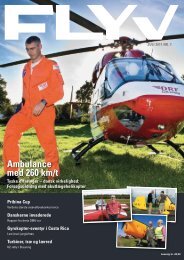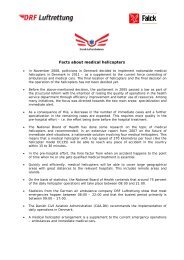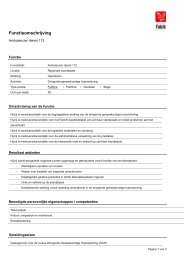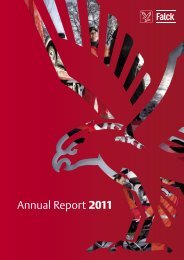Annual Report 2010 - Falck
Annual Report 2010 - Falck
Annual Report 2010 - Falck
Create successful ePaper yourself
Turn your PDF publications into a flip-book with our unique Google optimized e-Paper software.
42 <strong>Falck</strong> <strong>Annual</strong> <strong>Report</strong> <strong>2010</strong> | Management review<br />
Risk factors<br />
The Board of Directors and the Executive Management Board<br />
of <strong>Falck</strong> regularly monitors and assesses the Group’s overall<br />
risk exposure relative to probability and implications as well<br />
as established risk measures. A policy has been established for<br />
material risks under which key persons have been designated<br />
with a view to ensuring necessary controls and monitoring of<br />
risks. The Board of Directors and the Executive Management<br />
Board monitors developments in risks relative to an established<br />
risk strategy.<br />
This description of risk factors includes examples of the risks<br />
which Management estimates may have an impact on the<br />
Group’s future growth, activities, financial position and results<br />
of operations.<br />
The following sections do not contain an exhaustive description<br />
of all risks associated with the activities of the Group. The risk<br />
factors are divided into business risks and financial risks and are<br />
described in random order.<br />
The Board of Directors<br />
and Executive<br />
Management<br />
Board monitors<br />
developments in<br />
risks relative to an<br />
established risk<br />
strategy<br />
Business risks<br />
Political risks<br />
Some of <strong>Falck</strong>’s activities are based on contracts with public<br />
authorities. <strong>Falck</strong>’s opportunity of renewing existing contracts<br />
and winning additional contracts is dependent on the political<br />
decision-making process with regard to outsourcing of<br />
public-sector operating activities. If <strong>Falck</strong> does not have the<br />
opportunity to renew or successfully tender for these contracts,<br />
or if contracts are terminated, it may therefore have a material<br />
adverse impact on <strong>Falck</strong>’s business.<br />
Image<br />
<strong>Falck</strong> has a strong image built up over a long period of time<br />
which to some extent is the product of <strong>Falck</strong> operating in a<br />
number of areas that are subject to a high level of public interest.<br />
This strong image is of material importance to the Group’s<br />
ability to retain and develop <strong>Falck</strong>’s activities. There is consequently<br />
very high focus on ensuring that <strong>Falck</strong> operates morally<br />
and ethically correctly and with a high quality of the services<br />
provided.<br />
Cost structure<br />
<strong>Falck</strong>’s activities are labour-intensive and consequently affected<br />
by the cost of labour, pensions, regulations on working hours,<br />
social security contributions and other employee benefits<br />
provided to <strong>Falck</strong>’s employees. <strong>Falck</strong> may be affected by nonacceptance<br />
by the market of price increases, including increases<br />
in payroll costs. However, historically, it has been possible to<br />
include a large proportion of increases in payroll costs in <strong>Falck</strong>’s<br />
pricing.<br />
Especially in the Assistance business and to some extent in<br />
the Healthcare business, the costs are also dependent on the<br />
extent to which customers use the resources provided for in the<br />
subscription contracts. For instance, increased use of assistance<br />
by subscribers of roadside assistance will entail increased costs<br />
related to such responses.<br />
Attracting and retaining employees<br />
<strong>Falck</strong> relies on being able to attract and retain employees with<br />
special competencies and experience in order to achieve its<br />
business goals. The special competencies are to a great extent<br />
built up during the employment relationship. The Group has<br />
historically had a low staff turnover rate, but continually implements<br />
initiatives both locally and in the Group as a whole aimed
















